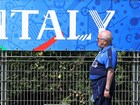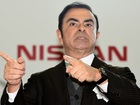Retailers aren't just ushering the official start of the holiday season with the usual expanded hours and fat discounts on big TVs and toys.
They're offering new ways for shoppers to get deals online and in the store easier and faster in the age of instant gratification.
 Full Story
Full Story
Nissan's disgraced former chairman Carlos Ghosn under-reported his income by a total of $71 million -- much more than initially suspected -- Japanese media reported Friday.
 Full Story
Full Story
Frank Buhler, a leader of the protesters who have barricaded French highways over the past week, aims to color Paris in the movement's trademark yellow on Saturday when rural France takes its fight with President Emmanuel Macron to the capital.
The 53-year-old political activist has called on demonstrators to swarm Paris "on foot, horseback or by car" for the second round Saturday of a battle between centrist President Emmanuel Macron and rebels from the provinces.
 Full Story
Full Story
China said Thursday that it "cannot accept" Washington's latest accusations of unfair trade practises as the two economic giants exchanged barbs ahead of a key meeting between their presidents later this month.
 Full Story
Full Story
Asian equities chalked up modest gains Thursday in light trading ahead of the US Thanksgiving holiday, following a rebound in energy and tech stocks on Wall Street.
 Full Story
Full Story
The Italian economy is forecast to grow 1.3 percent next year, the national statistics agency said Wednesday, below the government's estimate of 1.5 percent included in a big-spending budget rejected by Brussels.
 Full Story
Full Story
Energy companies suffered further losses on Wednesday following a collapse in oil prices while most Asian markets fell, but with the sharp losses witnessed in the morning being tempered.
 Full Story
Full Story
Nissan and Mitsubishi shares plunged Tuesday after chairman Carlos Ghosn was arrested for alleged financial misconduct, that reportedly included exorbitantly priced houses and diverted compensation.
The two automakers have already said they will propose removing Ghosn, and Renault -- which the titan also heads -- said it would meet later in the day to discuss his fate.
 Full Story
Full Story
Global wine production rose 13 percent this year, after a catastrophic 2017 which was marked by heatwaves, frosts and hailstorms, the International Organization of Vine and Wine (OIV) said Monday.
It said production was estimated at 279 million hectoliters (mhl) this year, "one of the highest since 2000."
 Full Story
Full Story
Brazilian-born Carlos Ghosn, who is facing a pay scandal in Japan, has long stood out among the world's auto executives as a hard-nosed workaholic willing to take drastic measures to get companies back on their feet quickly.
As head of the Renault-Nissan-Mitsubishi alliance, Ghosn has created an industrial behemoth, its combined 470,000 employees selling 10.6 million vehicles last year from 122 factories around the globe.
 Full Story
Full Story



